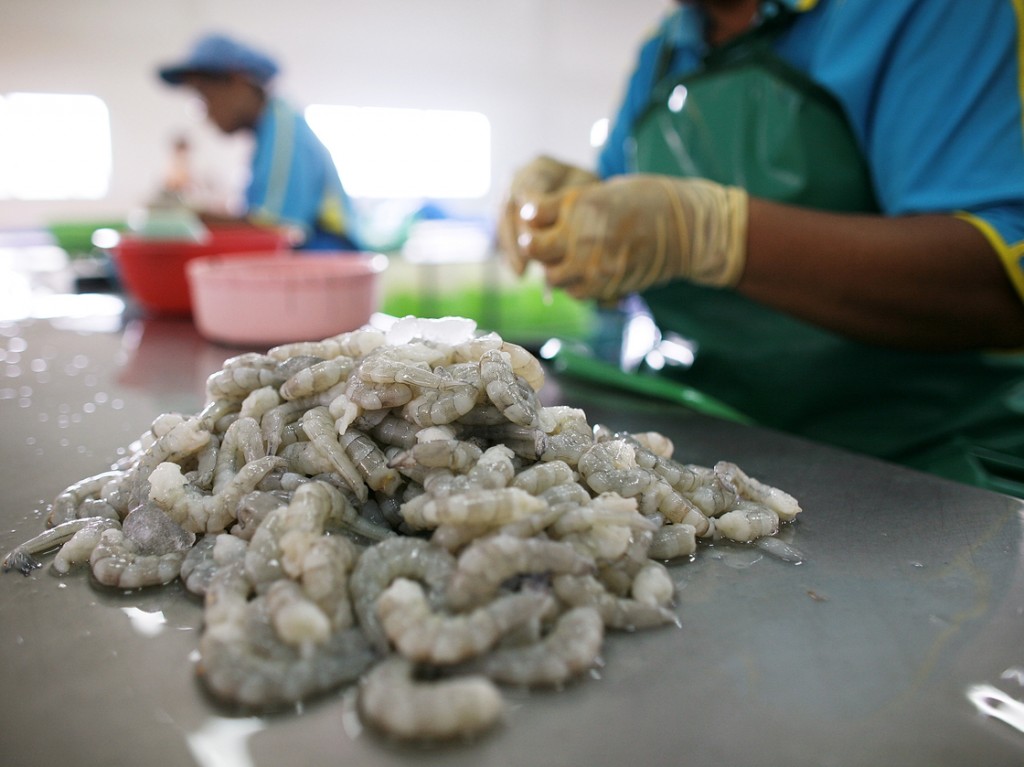As NPR's Michele Kelemen reports, the State Department hopes that this year's report will hit home with Americans. And so an official reminds us that as consumers, we are at one end of a food supply chain that sometimes leads back to slavery.
Luis CdeBaca, the official in charge of the office that monitors and fights trafficking, told Michele:
"This year's report looks at things like the fishing industry — and actually raises a question that I think all of us should be asking, which is: How much of my life is impacting modern-day slavery? Do I know where the shrimp is being caught or processed that is on my plate?"
CdeBaca's comment was a lightly veiled reference to shrimp farms and processing plants in Thailand, which labor groups claim are heavily reliant on migrant workers from Laos, Burma and Cambodia.
Because of ongoing issues on shrimp farms and elsewhere, for the fourth year in a row, the State Department put Thailand on the "Tier 2 Watch List" for failing to increase efforts to address human trafficking, compared to the previous year.
Thailand is the source of one-third of all shrimp imported by the U.S. American retailers (and consumers) like it in part because it is cheap. Labor abuses at Thai shrimp factories and farms that export are well-documented. As PBS reported last year, Thai labor activists have documented abuses of Burmese migrant workers who work in the shrimp-peeling sheds that supply shrimp to larger factories for export to the U.S.
A recent briefing paper by the International Labor Rights Forum and the Warehouse Workers United noted labor abuses at Thai shrimp producer Narong Seafood, which has been a major supplier to Walmart and a leading shrimp processor for the U.S. market. But despite the prevalence of abuse, the paper recommends that Walmart not drop Narong as a supplier, but instead "work with labor and human rights activists in Thailand to ensure the rights of the workers who produce shrimp for Walmart in Thailand are respected."
Forced labor, including debt bondage, also continues to sustain palm oil plantations in Malaysia, also on the Tier 2 Watch List, and Indonesia. (Palm oil is used in lots of processed foods, from Dunkin Donuts to Girl Scout cookies.) Cargill, the largest importer of palm oil and trader of 25 percent of the world's palm oil supply, says it has a policy of not using any slave or child labor. But the Rainforest Action Network has alleged that one of Cargill's palm oil suppliers used slave labor on the island of Sumatra in Indonesia.
Even in the U.S., food workers aren't exempt from abuse and even slavery. As our NPR colleague Yuki Noguchi reported last month, men with intellectual disabilities who worked at an Iowa turkey-processing plant suffered severe verbal and physical abuse for over 20 years. A jury eventually awarded the men approximately $3,000,000, the largest jury verdict in the history of the U.S. Equal Employment Opportunity Commission.
And we here at The Salt have previously told you about labor groups that have documented cases of enslaved migrants working in Florida's tomato industry.
To get a rough idea of how your consumption habits may lead back to slave labor, use the calculator at SlaveryFootprint.org.
Copyright 2013 NPR.
